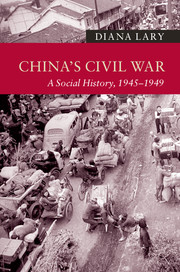Book contents
- Frontmatter
- Dedication
- Contents
- List of figures
- List of tables
- List of maps
- Acknowledgements
- Introduction
- 1 The social background to the Civil War
- 2 Ending one war, beginning another: August 1945–June 1946
- 3 Turning points: July 1946–June 1947
- 4 All-out war: July 1947–June 1948
- 5 Nearing the end: July 1948–January 1949
- 6 The end game: February–December 1949
- 7 Immediate outcomes: the early 1950s
- 8 Social outcomes of the Civil War
- Conclusion
- Glossary
- Index
Conclusion
Published online by Cambridge University Press: 05 March 2015
- Frontmatter
- Dedication
- Contents
- List of figures
- List of tables
- List of maps
- Acknowledgements
- Introduction
- 1 The social background to the Civil War
- 2 Ending one war, beginning another: August 1945–June 1946
- 3 Turning points: July 1946–June 1947
- 4 All-out war: July 1947–June 1948
- 5 Nearing the end: July 1948–January 1949
- 6 The end game: February–December 1949
- 7 Immediate outcomes: the early 1950s
- 8 Social outcomes of the Civil War
- Conclusion
- Glossary
- Index
Summary
There was no doubt at the time, nor has there been since, about who won China's Civil War. It was the CCP, under its dominant and charismatic leader Mao Zedong. The new regime immediately put its stamp on China. As at the start of imperial dynasties, the state was renamed, and the dating of history restarted. The new state was the People's Republic of China, the Zhonghua Renmin Gonghe Guo. The Republic of China, the Zhonghua Minguo, ceased to exist, except on Taiwan. The new dating system marked the break with the old system, in two ways. There was a fundamental break. The end of the Civil War was named the Liberation, Jiefang. China was liberated from her past. Previous or subsequent events were described as Before Liberation or After Liberation. And there was a modernist twist to the new dating. In the dynastic period, the counting of years was restarted with the accession of each new emperor, for example the First Year of the Qianlong Reign. Now the CCP switched China's dating to the Western system – or, more accurately, to the system used in the USSR. The year of liberation started as the 38th Year of the Republic and ended as 1949 of the Common Era.
There was no doubt either about who lost the Civil War. It was the GMD, and its blundering, indecisive leader Chiang Kai-shek. He was blamed for the loss of the Mainland by many of his own supporters, by much of the natural consistency of the GMD, the middle classes and those with Western connections, and by much international opinion. The GMD defeat was seen, in the West as a huge victory for communism, a terrible loss to the democratic West. It was one of the worst imaginable outcomes, a sudden and terrifying intensification of the Cold War, with the state with the world's largest population gone over to the Reds.
- Type
- Chapter
- Information
- China's Civil WarA Social History, 1945–1949, pp. 239 - 264Publisher: Cambridge University PressPrint publication year: 2015



